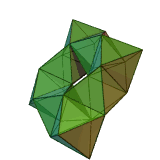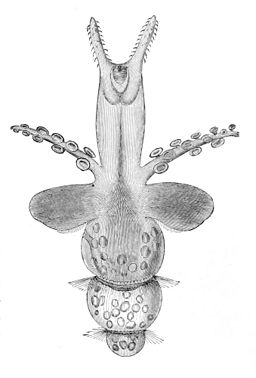Sunday, January 30, 2011
Saturday, January 29, 2011
Blue spheres
 |
| AquaGems. The patterns visible in some are reflections from the glass container. |
 |
| "Fried" marbles, with internal fractures caused by rapid heating and cooling |
Friday, January 28, 2011
Wednesday, January 26, 2011
"Illustrations of Madness... Embellished with a Curious Plate"
 |
| Illustration of the "air loom" imagined by 18th-century paranoiac James Tilly Matthews, who believed that such a device was being used to torture him from a distance. |
Tuesday, January 25, 2011
The poet's mistress
The ideal of feminine beauty in the 17th century demanded that women have the characteristics that are literally depicted in this illustration from Charles Sorel's The Extravagant Sheperd (London, 1654): teeth like pearls, eyes that sparkle like the sun, eyebrows arched like Cupid's bow, cheeks a-bloom with roses, and breasts like little globes or, as one writer put it, "little worlds of beauty."A colored version can be found here.
Monday, January 24, 2011
Ramon Llull's theological sentence generator
The roots of artificial intelligence and digital text generation go back to the Middle Ages:
Similar algorithms can be applied to produce sappy love letters or financial reports.
Ramon Llull’s Ars Magna provides a mechanical process for generating true statements and even proofs...
Llull provides four figures in the form of circular or tabular diagrams which recombine the elements of this table in different ways... the first figure produces combinations of absolute principles – ‘Wisdom is Power’, say. The second figure applies the relative principles – ‘Angels are different from elements’. The third brings in the questions – ‘Where is virtue final?’. The fourth figure is perhaps the most exciting: it take the form of a circular table which is included in the book as a paper wheel which can be rotated to read off results...
The kind of thinking going on here is not, it seems to me, all that different from what goes into the creation of simple sentence-generating programs today, and it represents a remarkable intellectual feat.
 |
| Llull's figure 1 |
Sunday, January 23, 2011
Vessels filled with light
These are essentially small, static versions of Lumia compositions. The light source is a Brightspot.
Saturday, January 22, 2011
Three candles
These birthday-cake-type candles contain chemicals (probably some of the same ones at work here) which add color to their flames.
Thursday, January 20, 2011
"...delicatessen cataract napkins of lightning chased one comp like battling fiery dragons"
A Dada-esque video based on vaguely Biblical gibberish text from a spam e-mail:
More nonsensical spam text here.
More nonsensical spam text here.
Wednesday, January 19, 2011
Avian phonetics
 |
| Scan from A Guide to Bird Songs by Aretas A. Saunders |
The notation shows five qualities of a bird's song: time, pitch, volume, quality, and phonetics. At the top of the diagram is an indication of quality: clear, loud whistle, or harsh rattle, or the like. Below is the notation of the song in lines that are continuous or broken, of longer or shorter length, rising or falling, thicker or thinner, to indicate the line of the song and the duration of each note and the song as a whole. To the left is an indication of the musical pitch of the most prominent note or the mid point of the song. At the bottom is a phonetic transcription of the song, which, when combined with the information above, gives an indication of what the bird is saying in song.The curves placed over these birdsong transcriptions resemble the intonation contours used to describe human speech.
Tuesday, January 18, 2011
Nova and Romanesco
Though this fractal resembles a fancy tiara, zooming in reveals whirling plantlike patterns reminiscent of the impressive Romanesco Broccoli.
Monday, January 17, 2011
Sunday, January 16, 2011
Monarch's wing
No butterflies were harmed in the making of this photo-- I found that detached wing on the sidewalk about two years ago, and preserved it in the plastic box seen here.
Saturday, January 15, 2011
Thursday, January 13, 2011
Glass harmonica
This instrument is played by rubbing a wet finger along the rims of different-sized glass bowls (as one can do with a wineglass), creating different notes. Its sound (another sample here) is pleasant but vaguely unnerving. According to Wikipedia, there is a deep-seated sensory reason for this spookiness:
The somewhat disorienting quality of the ethereal sound is due in part to the way that humans perceive and locate ranges of sounds. Above 4,000 Hertz we primarily use the volume of the sound to differentiate between each ear (left and right) and thus triangulate, or locate, the source. Below 1,000 Hertz we use the 'phase differences' of sound waves arriving at our ears to identify left and right for location. The predominant timbre of the armonica is in the range from 1,000-4,000 hertz, which coincides with the sound range where the brain is 'not quite sure' and thus we have difficulty locating it in space (where it comes from), and referencing the source of the sound (the materials and techniques used to produce it).
Wednesday, January 12, 2011
Synthetic babbling
NETtalk is a computer model of language learning and speech synthesis, which can be "trained" to read texts aloud by associating words or letters with sounds. In this audio demo of its progress, it moves from essentially random babbling to comprehensible speech (though with odd intonations and a few mispronunciations).
Tuesday, January 11, 2011
Monday, January 10, 2011
Toroid
If this polyhedron were made of rubber which could be stretched without tearing, it could be morphed into a donut or a coffee cup.
Saturday, January 8, 2011
The Constitution as celestial mechanics
...Montesquieu insists that the English Whigs copied the new astronomy when they were creating the modern British Constitution. Referring to this in one of his essays, Woodrow Wilson drew attention to the fact that the Constitution of the United States had been made on the same principle. 'They [writers in the Federalist] speak of the checks and balances of the Constitution,' he said, 'and use to express their idea the simile of the organization of the universe and particularly of the solar system....'From a passage on the metaphorical uses of mechanical and scientific terms during the Enlightenment, in History in English Words by Owen Barfield.
Friday, January 7, 2011
HATE BOOMERANGS
I saw those words on the sign in front of a local liberal church, and was momentarily confused about how to parse them correctly.
Analysis below the fold:
Analysis below the fold:
Thursday, January 6, 2011
God the geometer

Medieval illustration showing God as an architect, tracing out the world with a geometer's compass.
Curiously, the cosmos in God's hand (as yet without form and void) looks rather like a Mandelbrot Set.
Wednesday, January 5, 2011
Turbulence
The patterns of mud swirling in this creek reminded me of the cloud bands of Jupiter-- and more tragically, of last year's Gulf oil spill.
Tuesday, January 4, 2011
Monday, January 3, 2011
Sea snails, monstrous and angelic
Larva of the sea angel Pneumoderma, illustrated in an 1893 natural history book
Adult sea angel, species Clione limacina
Sunday, January 2, 2011
Gouldian Finch
If the Wikipedia article is to be believed, these birds are not just spectacularly colored, they're luminescent, at least in youth: "Very young birds also have blue, phosphorescent beads on the sides of their beaks to help their parents see them in the dark."
Subscribe to:
Comments (Atom)




















